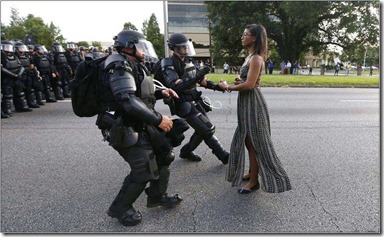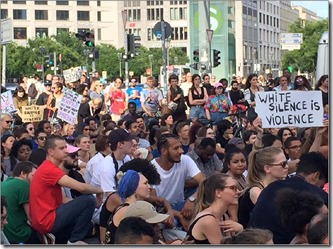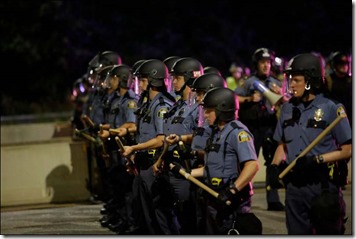Christopher Smith, right, leads chants during a protest for higher wages for fast food workers outside a McDonald’s in Memphis, Tenn., Thursday, April 14, 2016.
Forty-nine years after King was assassinated, the left’s organizing vanguards seek to continue his work.
American Prospect
April 4, 2017 – On the April 4, 1968, Reverend Dr. Martin Luther King Jr. was gunned down on the balcony of the Lorraine Motel in Memphis, Tennessee, where he had come to support the city’s striking sanitation workers, virtually all of them African American. The workers were embroiled in a heated labor dispute with the city government over low wages, dangerous working conditions, and its unyielding opposition to recognizing their union.
Forty-nine years later, much has changed, yet much more has stayed the same. Despite landmark advancements in civil rights, black Americans still face staggering levels of systemic social and economic inequities and rampant state-sanctioned violence and discrimination. Black men are three times more likely to be killed by police than white men, and are incarcerated at a rate five times higher than white men. Meanwhile, black men make 22 percent less in wages compared with white men who live in the same areas, with the same levels of education and work experience. Black women make 11.6 percent less than their white counterparts. On average, white households hold 16 times the wealth of black households. Today, 54 percent of African American workers make less than $15 an hour.
And 49 years later, black activists are still leading large-scale movements to address these injustices. On the anniversary of King’s assassination, Fight for 15 workers and Black Lives Matter activists—many already involved in both movements—are joining together for a series of protests across the country to elevate their intersecting demands for racial justice and economic justice. The actions today not only seek to emphasize and build upon African Americans’ inextricable and intertwined struggle for both civil rights and economic justice of the 1960s, but create a broader front of intersectional progressive power to face off against the Trump administration’s attempt to roll back both.
Activists in 24 cities will be mounting demonstrations and teach-ins under the banner of “Fight Racism, Raise Pay.” They plan to call attention to the systematic targeting of communities of color—ranging from abusive local police departments that harass people of color, to Republicans in the states advancing anti-protest legislation in response to Black Lives Matter and Fight for 15 while at the same time stifling local minimum-wage hikes through state legislation. Activists will also call out the Trump administration for advancing an anti-worker agenda, supporting voter suppression, and threatening immigrant communities.
“Our two movements have a common bond in fighting the racism that keeps down people of color everywhere,” said Latierika Blair, a 23-year-old McDonald’s worker in Memphis, in a statement.
The actions center on Memphis, Tennessee, where thousands of workers, activists, and civil rights leaders will march to and hold a memorial outside the Lorraine Motel. In the mid-South city, Fight for 15 activists have encountered aggressive resistance as fast-food workers organized for higher wages and union rights. As The Guardian reported, organizers alleged in an a lawsuit filed in March that, with the “authorization from the president of McDonald’s,” the Memphis police department was authorized to arrest McDonald’s employees and engaged in a “widespread and illegal campaign of surveillance and intimidation.” Last November, the suit states, police officers allegedly followed organizers home after meetings, banned activists from entering city hall, and in one instance even stepped behind a McDonald’s counter to stop workers from signing a petition demanding better working conditions. Based on these and other allegations, the lawsuit argues that the police department was acting in concert with McDonald’s.
“White supremacy and corporate greed have always been linked in America,” said Chelsea Fuller, an organizer with the Movement for Black Lives, in a statement. “The fast-food workers who are going on strike for $15 an hour and the right to a union are resisting the same institutional racism and oppression that fuels police violence across the country. We are stronger when we stand together, and so our movements are going to keep fighting back against the twin evils of racial and economic inequality that continue to hold back black and brown people.”
Less than 250 miles southeast, in Alabama, the state legislature, dominated by white lawmakers, passed a law prohibiting localities from instituting their own minimum-wage laws after the city council in majority-black Birmingham had passed legislation in 2015 to phase in a $10.10 hourly minimum wage. The NAACP promptly responded with a lawsuit claiming that the GOP super-majorities in the statehouse and the Republican governor rammed through the legislation in 16 days in order to block Birmingham’s ordinance—which would have largely benefited black low-wage workers—from going into effect, a move that the lawsuit claims was tainted with “racial animus” and undermines the power of the city’s black electorate. A judge has since thrown out the case. (Continued)
Continue reading Fight for 15 and Black Lives Matter Join Forces on Anniversary of MLK’s Death





